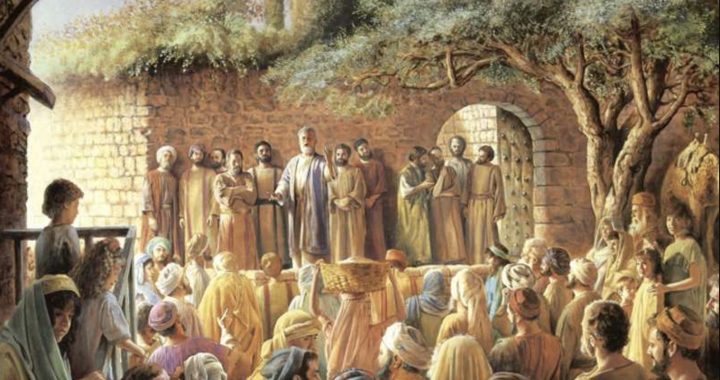Church grows when disciples are spiritual multipliers of Christ-pointers
Being a Catholic doesn’t necessarily mean that a person is a disciple of Jesus. What defines a disciple according to Campus Crusade’s Christopher Adsit is, “a person-in-process who is eager to learn and apply the truths that Jesus Christ teaches him, which will result in ever deepening commitments to a Christlike lifestyle.”
Keeping this in mind, we can draw inferences from our roles as disciple-maker.
1. A catechist
‘Catechesis’ is a biblical word that has its root idea in being an ‘echo’. It isn’t the responsibility of the disciple-maker to re-teach the entire Catechism but he must believe and teach in accord to what has been handed down by Jesus Christ and the Church. In spite of 10 years of formal catechesis, our young Catholics don’t know a lot of what should be considered basic, for example, “What are the proofs for the divinity of Christ”, “Why did Jesus die on the Cross?”, “What is Sacred Tradition”, “Why is LGBT relationships wrong?”, etc. Without a renewal of the mind (Roms 12:2), it is very difficult to proceed to form convictions, actions and lifestyles.
Disciple-makers are catechists inasmuch as we offer “an apprenticeship in the entire Christian life” (General Directory of Catechesis #30 https://bit.ly/3T5FRIl). Of course, we move through stages of life so we may have various mentors for each one of these. To cite a few of these, disciple-makers of teenagers may need to focus on interior life, campus students on their gender roles, young adults on business and financial discipleship (e.g. Compass Catholic Finance), and the newly married on family life. Whichever of these areas of focus, disciple-makers must be witnesses and models, before they are teachers.
2. A companion for the spiritual journey
My modern inspiration for the ministry of accompaniment comes from Pope St John Paul II, who as a young priest went on picnics and kayaking with young people. Meeting them in their leisure time means becoming a foodie. We celebrate holidays and birthdays together. But as Pope Francis warns, ‘Spiritual accompaniment must lead others ever closer to God …To accompany them would be counterproductive if it became a sort of therapy supporting their self-absorption and ceased to be a pilgrimage with Christ to the Father.’ (Evangelii Gaudium aka Joy of the Gospel #170).
Listen to and invite them into spiritual conversations, “What do you think is the purpose of your life?”, “What are the significant moments in your spiritual journey and where are you right now?” “If Jesus were right here, what would you want Him to do for you?”. If they are baptised, invite them to Sunday Mass and continue regular meet-ups and fellowship events.
Like the story of the Little Prince befriending a fox who teaches him that the important things in life are visible only to the heart. So, meeting regularly with those on a spiritual journey and sharing stories of life with them is what builds authentic friendships (1 Thes 2:8). And it’s okay if some are not yet ready for discipleship. Some may be going through a personal crisis and may just need someone to talk to, even a referral to a counsellor. For others, time is limited as they have other commitments like part-time jobs.
But eventually, like Jesus who selected the Twelve to ‘be’ with him (Mark 3:14), invite those who have been proven to be faithful, available, contagious and teachable (F.A.C.T.) into a discipleship relationship. This starts with a presentation of the Gospel, with a step-by-step follow-up to train and build them up till they discover their unique vocation (Joy of the Gospel #171). We will discuss this process in greater detail in my later postings.

3. A Christ-pointer
Jesus said, “Do not be called ‘Master’; you have but one master, the Messiah” (Matt 23:11). While you are a disciple-maker, the person you are forming is not your disciple; he is Christ’s. Christ is the one who causes the growth. And sometimes, it means, that for whatever reason, the person may prefer to be discipled by someone else. Other times it may be due to a specialised area in which he may need mentorship: For example, how to be a disciple of Jesus in the medical profession. And that’s okay.
Ultimately the goal of the disciple-maker is two-fold. First, it is that the person we are discipling becomes a canonisable saint (Eph 1:4)! That he will be conformed to Christ (8:29)! That he will be filled with the divine nature (theosis, 2 Pet 1:4)! This formation of his character, of his being, should be a priority above everything else.
The second goal is for the one we are discipling to bear fruit, that he becomes a spiritual multiplier (2 Tim 2:2). The discipleship relationship only comes to some “end” when the one we are discipling has captured the conviction for Jesus Christ to “go and make disciples of all nations” (Matt 28:19).
Finally, note that the structure of the Church does have a formal provision for the ministry of disciple-making. It’s called God-parenting or being a sponsor. After Vatican II, the Church retrieved the ancient model of the Rite of Christian Initiation for Adults (RCIA) but it’s a shame that there’s not a lot of guidance to Godparents on how to effectively involve them in the process.
Are you ready to embrace these roles as a disciple-maker? What are some of your concerns as you undertake this responsibility?




